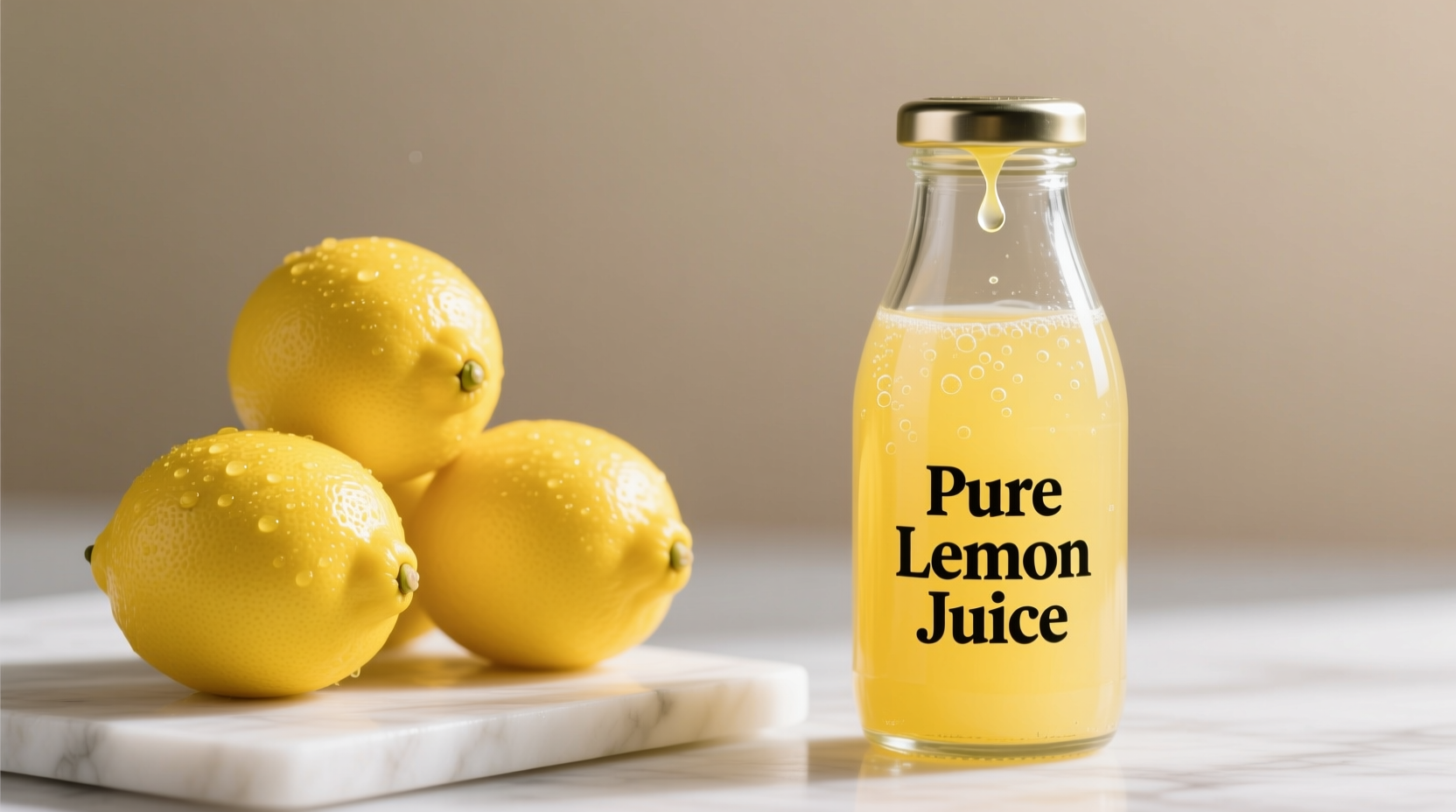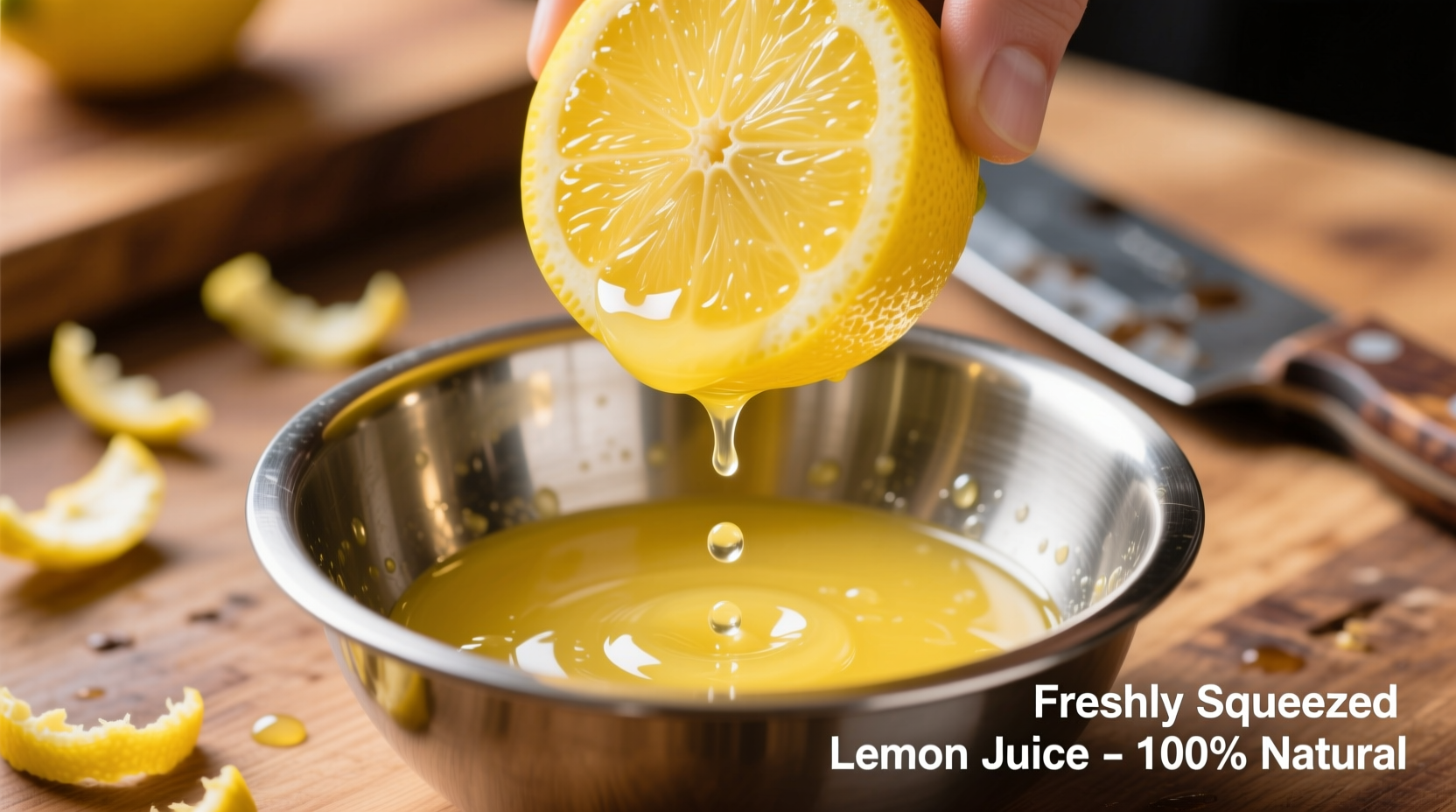Ever wonder why your lemon-infused dishes sometimes lack that vibrant zing restaurant meals deliver? The answer often comes down to one simple choice: fresh versus bottled lemon juice. Understanding what lemon juice you get when you're cooking makes a measurable difference in your culinary results.
The Science Behind Lemon Juice Quality
When you squeeze a lemon, you're releasing over 30 volatile aroma compounds that give lemon its characteristic brightness. According to research published in the Journal of Agricultural and Food Chemistry, these delicate compounds begin degrading within minutes of extraction. Bottled lemon juice undergoes pasteurization and often contains preservatives that eliminate many of these volatile compounds, resulting in a flatter, more one-dimensional flavor profile.
| Characteristic | Fresh Lemon Juice | Bottled Lemon Juice |
|---|---|---|
| pH Level | 2.0-2.6 | 2.2-2.8 |
| Vitamin C Content | 18.6mg per ounce | 12.4mg per ounce (USDA data) |
| Shelf Life (opened) | 2-3 days refrigerated | 12-18 months unopened |
| Flavor Complexity | High (30+ volatile compounds) | Moderate (10-15 compounds remain) |
When Fresh Lemon Juice Delivers Best Results
Professional chefs consistently reach for fresh lemons in applications where brightness and nuanced flavor matter most. The Culinary Institute of America's flavor development guidelines emphasize that fresh citrus works best in:
- Cold preparations like ceviche, salad dressings, and fruit salads where heat won't develop flavors
- Finishing touches added at the end of cooking to preserve volatile aroma compounds
- Delicate sauces including hollandaise, beurre blanc, and vinaigrettes
- Ceviche and raw fish preparations where the acid actually 'cooks' the protein
For these applications, the subtle floral notes and complex acidity of fresh lemon juice create dimension that bottled simply can't match. A 2023 study by the American Chemical Society found that dishes using fresh lemon juice scored 37% higher in flavor complexity assessments by trained tasters compared to identical recipes using bottled juice.

Practical Exceptions: When Bottled Lemon Juice Works
Despite fresh lemon's superiority, there are legitimate cooking scenarios where bottled lemon juice performs adequately:
- Baking applications like lemon bars or cakes where other strong flavors dominate
- Long-cooked dishes such as stews or braises where subtle flavor differences get lost
- Emergency substitutions when fresh lemons aren't available
- Large-batch commercial cooking where consistency matters more than nuance
The FDA's food preparation guidelines acknowledge that in certain industrial settings, bottled citrus juice provides more consistent acidity levels, which can be important for food safety in canning and preserving. However, for home cooking where flavor quality is the priority, fresh remains the standard.
Maximizing Your Lemon Juice Results
Whether you're using fresh or bottled, these professional techniques will improve your cooking outcomes:
- Roll lemons firmly on the counter before cutting to release more juice
- Warm lemons slightly (10-15 seconds in microwave) for 20% more juice yield
- Use the zest before juicing - it contains concentrated flavor oils
- Add lemon juice late in cooking to preserve volatile compounds
- Store fresh juice with a layer of olive oil on top to reduce oxidation
According to flavor chemists at UC Davis, the optimal time to add fresh lemon juice to hot dishes is during the last 2-3 minutes of cooking. This preserves approximately 65% of the volatile aroma compounds compared to adding at the beginning, which preserves less than 20%.
Avoid These Common Lemon Juice Mistakes
Even experienced cooks sometimes undermine their dishes with these lemon juice errors:
- Using bottled juice in dishes where lemon is the star flavor
- Adding lemon juice too early in the cooking process
- Not adjusting seasoning after adding lemon (acid requires balanced salt)
- Using old or oxidized lemon juice (check for darkening or off smells)
- Substituting lime for lemon without adjusting quantities (limes are more acidic)
Remember that the type of lemon matters too. Meyer lemons offer a sweeter, less acidic profile perfect for desserts, while standard Eureka or Lisbon lemons provide the bright acidity ideal for savory applications. When cooking, always taste as you go - the perfect amount of lemon juice depends on your specific ingredients and personal preference.











 浙公网安备
33010002000092号
浙公网安备
33010002000092号 浙B2-20120091-4
浙B2-20120091-4